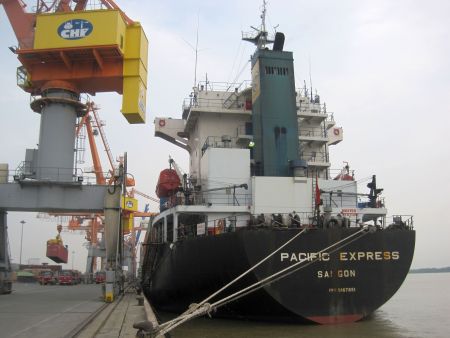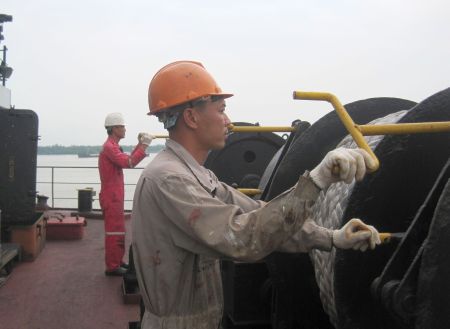Global shipping industry sets sail under new standard
A new “bill of rights” – the ILO’s Maritime Labour Convention – comes into force, ensuring protection for the world’s 1.5 million seafarers and fair competition for shipowners. Viet Nam is the 37th country to ratify the Convention.
GENEVA (ILO News) – The International Labour Organization’s Maritime Labour Convention (MLC, 2006) comes into force on 20 August 2013, inaugurating a new era of decent work for seafarers and fair competition for shipowners in the global shipping industry.
“This Convention is a milestone in maritime history,” said ILO Director-General Guy Ryder. “The product of tripartite dialogue and international cooperation, it enables decent working and living conditions for seafarers to be advanced, along with fair competition for shipowners in this, the most globalized of industries.”
The new Convention becomes binding international law as of 20 August. It needed ratification by 30 ILO member States, representing more than 33 per cent of global gross tonnage to enter into force. To date, more than 45 ILO member States representing over 75 per cent of global gross shipping tonnage have ratified the Convention.
The Convention has the full support of the International Transport Workers’ Federation (ITF), which represents seafarers, and the International Shipowners Federation (ISF), both of which played a key role during the five years of its development and in the adoption of the Convention at a special ILO International Labour Conference in 2006.
The MLC, 2006 also has the strong support of the International Maritime Organization (IMO), which oversees the global shipping sector, that moves some 90 per cent of world trade. The European Union has adopted Directives to give effect to the Convention, while the Paris MOU and the Tokyo MOU, which are port State control regional organizations have adopted MLC, 2006 compliant guidelines to strengthen port State control inspections.
“The coming into force of the MLC, 2006 is a unique event in the history of international maritme labour law,” said Cleopatra Doumbia-Henry, ILO Director of the International Labour Standards Department. “It is now incumbent on all to ensure that ratification and legal implementation translate into law and practice so that the world's seafarers can truly benefit from the protection of the Convention and that shipowners who meet the decent work requirements of the Convention can enjoy the benefits it offers.”
“The ILO will continue to work with governments and with seafarers' and shipowners' organizations and other key actors in the maritime industry to help ensure that the goals of the MLC, 2006 are achieved,” Doumbia-Henry stressed.
The Convention brings together, in one place, international minimum standards aimed at ensuring decent work for seafarers, while helping to provide a level playing field for quality shipowners operating under the flag of countries that have ratified the MLC, 2006 by promoting competitiveness through ensuring reliable and efficient shipping. The goal is to make sure that decent working conditions go hand in hand with fair competition.
Viet Nam – preparations underway
Viet Nam became the 37th country to ratify the Convention in May 2013.
According to the Viet Nam Maritime Administration, the country has nearly 32,000 licensed seafarers including about 27,000 still working in national flag and international vessels. Its 1,700 national flag ships cover one tenth of the country’s exports and nearly half of container goods on domestic routes.
Prime Minister Nguyen Tan Dung on 25 July approved the national MLC implementation plan. The important blueprint requires an overall upgrading of domestic marine laws by 2015; comprehensive assessment and certification for all Vietnamese ships in 2013; the establishment of a tripartite consultation mechanism involving representatives of the Government, ship owners and seafarers this year; and investment in public information and entertainment structures for seafarers at sea ports by 2020.
“I congratulate the Vietnamese Government on joining the MLC, their great efforts to bring the standards of their ships to the international level and strong commitment to protect their seafarers,” said ILO Viet Nam Country Director Gyorgy Sziraczki.
He confirmed that the organization would be “side by side with the country to provide capacity-building and technical assistance to enable it to overcome the challenges and bring the Convention into life”.
“This Convention is a milestone in maritime history,” said ILO Director-General Guy Ryder. “The product of tripartite dialogue and international cooperation, it enables decent working and living conditions for seafarers to be advanced, along with fair competition for shipowners in this, the most globalized of industries.”
The new Convention becomes binding international law as of 20 August. It needed ratification by 30 ILO member States, representing more than 33 per cent of global gross tonnage to enter into force. To date, more than 45 ILO member States representing over 75 per cent of global gross shipping tonnage have ratified the Convention.
The Convention has the full support of the International Transport Workers’ Federation (ITF), which represents seafarers, and the International Shipowners Federation (ISF), both of which played a key role during the five years of its development and in the adoption of the Convention at a special ILO International Labour Conference in 2006.
The MLC, 2006 also has the strong support of the International Maritime Organization (IMO), which oversees the global shipping sector, that moves some 90 per cent of world trade. The European Union has adopted Directives to give effect to the Convention, while the Paris MOU and the Tokyo MOU, which are port State control regional organizations have adopted MLC, 2006 compliant guidelines to strengthen port State control inspections.
 Maritime Labour Convention (MLC, 2006) aims to make sure that decent working conditions go hand in hand with fair competition. © ILO |
“The coming into force of the MLC, 2006 is a unique event in the history of international maritme labour law,” said Cleopatra Doumbia-Henry, ILO Director of the International Labour Standards Department. “It is now incumbent on all to ensure that ratification and legal implementation translate into law and practice so that the world's seafarers can truly benefit from the protection of the Convention and that shipowners who meet the decent work requirements of the Convention can enjoy the benefits it offers.”
“The ILO will continue to work with governments and with seafarers' and shipowners' organizations and other key actors in the maritime industry to help ensure that the goals of the MLC, 2006 are achieved,” Doumbia-Henry stressed.
The Convention brings together, in one place, international minimum standards aimed at ensuring decent work for seafarers, while helping to provide a level playing field for quality shipowners operating under the flag of countries that have ratified the MLC, 2006 by promoting competitiveness through ensuring reliable and efficient shipping. The goal is to make sure that decent working conditions go hand in hand with fair competition.
Viet Nam – preparations underway
Viet Nam became the 37th country to ratify the Convention in May 2013.
According to the Viet Nam Maritime Administration, the country has nearly 32,000 licensed seafarers including about 27,000 still working in national flag and international vessels. Its 1,700 national flag ships cover one tenth of the country’s exports and nearly half of container goods on domestic routes.
 Viet Nam has nearly 32,000 licensed seafarers including about 27,000 still working in national flag and international vessels. © ILO |
Prime Minister Nguyen Tan Dung on 25 July approved the national MLC implementation plan. The important blueprint requires an overall upgrading of domestic marine laws by 2015; comprehensive assessment and certification for all Vietnamese ships in 2013; the establishment of a tripartite consultation mechanism involving representatives of the Government, ship owners and seafarers this year; and investment in public information and entertainment structures for seafarers at sea ports by 2020.
“I congratulate the Vietnamese Government on joining the MLC, their great efforts to bring the standards of their ships to the international level and strong commitment to protect their seafarers,” said ILO Viet Nam Country Director Gyorgy Sziraczki.
He confirmed that the organization would be “side by side with the country to provide capacity-building and technical assistance to enable it to overcome the challenges and bring the Convention into life”.